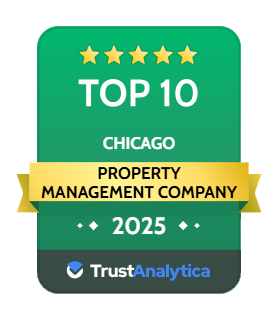How long have you been in business?
We recommend finding a company that has some experience in your market. Have they dealt with fires, tenant disputes, maintenance or utility issues, etc? You’ll want to make sure they have some successful years of experience. Hiring a brand new company that’s just getting started, can leave you to be their test subject.
How familiar are you with (your local) area?
You wan’t to make sure the company is familiar with the surrounding area of your property. You don’t want someone who is new to the area, or unfamiliar with the nuances of your neighborhood. You also want to make sure they are familiar with your local city and state laws. If the property is within the Chicago city limits, it’s subject to the Residential Landlord Tenant Ordinance (RLTO), which will drastically change how you manage certains aspects of the landlord-tenant relationship.
Which types of properties do you manage?
A property manager who manages single family or condo properties will have more expertise with HOA management, than commercial or retail property managers. Just make sure their portfolio is similar to yours.
If I have a question or concern, how soon can I expect to hear back.
For many people, their rental property is their biggest asset. If you have a question or concern, you deserve to hear back in a timely fashion. We hear time and time again from our new clients how it somehow would take days or weeks to get a response from their previous property management company. A quality property management company should always get back to you within 1 business day.
Which property management services do you currently offer?
Get clear on what services they offer - and what services you need. Every property management company offers a different suite of services. Ask what responsibilities they expect you to handle. Some companies offer different tiers of services, find out which one is the best fit for you and your goals.
Which areas does your company cover?
If you are considering expanding your rental portfolio, you may want to find a company with the capacity to handle your growth. A company that covers multiple neighborhoods and towns in the area might be best. Maybe they have multiple offices? On the contrary, you want to make sure the company isn’t spread too thin across large areas, or at least have a team big enough to handle them. For example, we serve the Chicagoland area, which includes over 20 different cities and towns.
How many rentals do you currently manage?
It’s important to understand the company's capacity to manage. Companies tend to manage anywhere between 15 and 1500 properties. It’s a good idea to understand how in demand they might be managing 1500 or more properties. Sometimes it’s best to go with a smaller company that can give you more personalized service.
How do you set your rental rates?
Any credible company should be able to run a market analysis that estimates rental rates for your property. We offer a free rental analysis on our site to help you get started.
How do you fill vacant properties quickly, without sacrificing tenant quality?
A property manager's answer for quick tenant placement will show you more about their leasing strategies. You’ll want to make sure they’re taking professional quality photos and listing it on the MLS as well as a variety of online rental websites such as Zillow, Trulia, Hotpads, etc. Visit the rental listings page on their website and take a look at the quality of their current listings.
Do you collect management fees when a unit is vacant?
You shouldn’t be paying a property manager if your property is empty. They should be incentivized to keep your properties consistently occupied. If they can’t deliver on this, they should be ok with forfeiting a little bit of income for your best interest.
How is your company structured?
Is their team specialized or generalists? Does one person handle marketing, another handles move-in day? Or do you work with one person? You’ll want to know who you’ll be working with throughout your contract - or if it will be multiple people.
Which types of insurance do you carry?
We recommend finding companies that carry at least a $1 million general liability policy, as well as an errors and omissions policy. You might consider having your lawyer look over their policy.
How and when do property owners get paid?
Don’t forget that you’re hiring them to make money. Find out when you’ll be receiving your checks, and how often.
What are your monthly management fees?
Management fees can vary depending on the services offered. Be wary of a low upfront management fee only to be nickel and dimed by a myriad of a la carte fees on the backend.Just make sure you’re clear on all expenses you’ll incur. It may differ in the Chicagoland Area versus the more rural areas of Illinois.
Can I cancel my contract without penalty if I'm unhappy?
You don’t want to find yourself stuck, 5 months into a contract, with a property management company that’s awful to work with. Make sure their cancellation policy is fair and reasonable.
What's your procedure for qualifying tenants?
Is the company screening their full-background? This could include employment, credit, and landlord references, bankruptcies, tax liens, etc. What are the components they screen for?
How long do units typically stay vacant after turnover?
If they are efficient and experienced, they will have properties flipped, and leased again within 30 days. This is plenty of time to refresh the unit and perform any repairs.
What's your process for handling service requests?
What is the process for tenants to communicate service requests to the PM, including your role in this. Who makes the final decisions about repairs and maintenance? Are you able to require authorization for expenses over a certain amount? Look for a company with a comprehensive process.
Do you have pre-existing relationships with local vendors?
This could save you a lot on maintenance and repairs. Find out who the property manager subcontracts with, and whether any discounts are available through those relationships. These could include painters, electricians, plumbers, and more. It’s definitely a benefit of going with a good PM company.
Will you be able to provide me with investment advice or help me to grow my portfolio?
If you plan to expand your portfolio, it will be best to partner with an experienced property management company. They will be able to help you to identify market opportunities, purchase and positioning of your assets that will help you make the most out of your money.
Of course, depending on your unique property, you may have other questions to ask. If you can, go and meet with potential property managers in person before you hire them. If they have a central office, go to the office and meet the team. Find out who you would be working with directly and ask them some of these questions.
Reach out today for more information or a free rental analysis!






.png)


